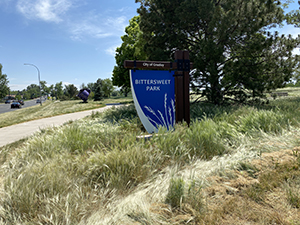You may have noticed a change or two  at Bittersweet Park. Taller grass, perhaps a tad less-manicured?
at Bittersweet Park. Taller grass, perhaps a tad less-manicured?
What may look a little wild to some really is a look of au naturale to the city and water conservationists. The park was “reimagined” into one that practices what Greeley preaches: using xeriscaping and low-water, native plants and grasses instead of non-native, water-thirsty ones.
The idea began in 2018, with the idea to replace the park’s outdated irrigation system that ran 10 hours a day, seven days per week. Designers wanted to focus on water conservation, drought resilience and habitat creation for the popular 31-acre park. Widely used for recreation, it also is the home of the Veterans’ Memorial and the Fallen Police Officer memorial, and several mature trees.
Residents who participated in park planning over three public meetings for the project chose the most ambitious approach, which was to replace 21 acres of turf with native varieties that once established would conserve water and reduce maintenance. The group also noted that there needed to be loops between pathways, pathways away from the edges of the park, and soft surface paths for running and cross-country skiers. In the end, the only remaining bluegrass would be on the south end of the park where most of the sports practices, and community activities take place.
See the changes for yourself here.
Construction began in January 2020 with the irrigation and construction of the paths. By spring, staff used herbicides to kill the existing bluegrass. By July, the irrigation system was complete, and seeding of native grasses began shortly after. Buffalo and Blue Gramma grass mix were planted in the hot, dry, open areas, while a salt-tolerant mix of cool season and warm season grasses were planted along the streets, which will withstand the salts from the winter snow removal. A shade-tolerant mix of fescues and wheat grasses were planted in the tree areas and two mixes, a short grass and a mid grass prairie mix were planted on the interior with the thought that the short grasses would be near paths and get progressively taller.
In all, the conversion took out just over 20 acres of Kentucky Bluegrass, replacing it with 13.37 acres of Buffalo Grass and 6.97 acres of taller, native grasses. This will result in a savings of 196 hours a year in mowing and a diesel fuel savings of 448 gallons a year.
After one year – and a savings of 9.2 million gallons of water that could otherwise supply roughly 30 households -- the park had an impressive lack of weeds, and residents were taking notice.
“At the end of the day, I know this conversion, and others we are planning, are vital to conserving water for the future,” said Parks Superintendent, Eric Bloomer. “What’s the quote? ‘Sometimes it’s hard to do the right thing, but that doesn’t make it any less right.’”
For more information:
Bittersweet Park Improvements (greeleygov.com)
Read FAQs, seed mixes, water saving facts, construction schedule and more.